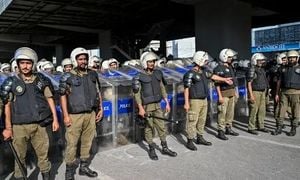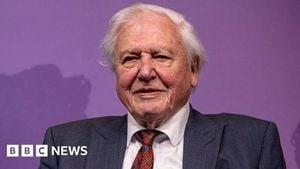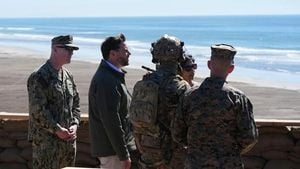Fifteen Ukrainian soldiers from the Aidar battalion, captured during the ongoing conflict with Russia, have been sentenced to lengthy prison terms by a Russian military court in Rostov-on-Don, sparking outrage from Kyiv and widespread condemnation from international human rights organizations. The verdict, delivered on October 17, 2025, marks the latest chapter in a series of high-profile trials targeting Ukrainian prisoners of war, raising serious questions about the legality of Russia’s judicial actions amid the war.
According to reports from Censor.NET and international news agencies, the Southern District Military Court sentenced the 15 soldiers to prison terms ranging from 15 to 21 years in a strict regime colony. The charges, officially classified as terrorism, stem from the soldiers’ service in the Aidar battalion—a unit Russia has designated as a terrorist organization. Ukraine, however, vehemently disputes this designation and maintains that the battalion is a legitimate part of its armed forces.
The Ministry of Foreign Affairs of Ukraine wasted no time in expressing its strong protest. In a statement released shortly after the verdict, the ministry declared the sentences “null and void and unlawful,” emphasizing that the convicted soldiers are prisoners of war under the Geneva Convention. “All attempts by the Russian Federation to prosecute Ukrainian prisoners of war for their lawful participation in the defense of their homeland are null and void and unlawful,” the ministry asserted, highlighting that the Geneva Convention explicitly prohibits prosecuting POWs for taking part in hostilities or for their affiliation with the armed forces of their country.
Ukraine’s human rights envoy, Dmytro Lubinets, echoed this sentiment, describing the trial as “shameful” and accusing Russia of “making criminals out of those who defended their native land.” Lubinets’s words resonate with the broader Ukrainian position: the prosecution of these soldiers is seen not only as a violation of international law, but also as a weaponization of the Russian judicial system for political ends.
Memorial, a prominent Russian human rights group, has also weighed in, designating the convicted soldiers as political prisoners. The organization argues that the trial grossly violated international conventions protecting POWs. “This grossly violates the provisions of the Geneva Convention, which prohibits the prosecution of prisoners of war solely for their participation in an armed conflict,” Memorial stated, underscoring the lack of specific war crimes charges against the defendants. Instead, they were prosecuted simply for serving in the Aidar battalion.
The trial itself was shrouded in secrecy for much of its duration. While journalists were permitted to attend the opening sessions and the verdict, most proceedings were held behind closed doors. The case originally involved 18 battalion members, but two nurses were returned to Ukraine as part of a prisoner swap, and proceedings against a driver are expected to be held separately. The court’s location—Rostov-on-Don, just 100 kilometers east of the Ukrainian border—was chosen for its proximity to the conflict zone and its status as the seat of Russia’s Southern Military District.
This is not the first time Russia has held mass trials for Ukrainian prisoners of war. In March 2025, the same court convicted 23 members of the elite Azov brigade on similar terrorism charges, a move that was also condemned by Ukraine as a violation of international law. Russia has consistently labeled both the Azov and Aidar battalions as terrorist organizations, accusing their members of war crimes. However, these units, formed as volunteer battalions in the wake of Russia’s 2014 annexation of Crimea, were later integrated into the Ukrainian military. While both Aidar and Azov have faced criticism over their origins—including allegations of far-right affiliations—current members have repeatedly rejected accusations of extremism or ties to ultra-nationalist movements.
For Ukraine, the sentences are more than a legal affront—they are a direct challenge to the country’s sovereignty and the rights of its defenders. The Ministry of Foreign Affairs has called on the international community to unequivocally condemn the Russian court’s actions, labeling the verdicts as yet another war crime committed by the Russian Federation. The ministry’s statement urged allies to increase political, diplomatic, and sanctions pressure on Moscow, with the goal of securing the immediate and unconditional release of all illegally detained Ukrainian citizens, including prisoners of war, political prisoners, and civilian captives. “We are convinced that the international community, which values the rule of law and human dignity, must support Ukraine and Ukrainian prisoners of war,” the ministry concluded.
The controversy surrounding the trial is further compounded by the lack of transparency and the apparent absence of evidence linking the defendants to specific war crimes. Instead, the prosecution’s case rested largely on the men’s membership in a battalion that Russia has unilaterally designated as terrorist. This approach, critics argue, undermines the fundamental protections afforded to POWs under international law and sets a dangerous precedent for the treatment of captured soldiers in future conflicts.
The international response to the verdict has been swift and critical. Human rights organizations and legal experts have pointed out that the Geneva Convention on the Treatment of Prisoners of War was designed precisely to prevent such prosecutions, ensuring that combatants captured in war are not punished simply for fulfilling their duties as soldiers. The convention, which both Russia and Ukraine are parties to, is clear: prisoners of war cannot be prosecuted for participating in hostilities or for their status as members of the armed forces.
Meanwhile, the families of the convicted soldiers, as well as the broader Ukrainian public, remain deeply concerned about the fate of their loved ones. The lengthy sentences—ranging from 15 to 21 years—mean that, barring diplomatic breakthroughs or further prisoner exchanges, these men could spend the better part of their lives in Russian prisons. The psychological toll of such uncertainty is immense, both for the prisoners themselves and for those waiting for their return.
As the war grinds on, the plight of Ukrainian prisoners of war has become a rallying point for Kyiv and its supporters. Ukraine’s determination to secure their release is matched by its insistence that international law must be respected, even in the midst of a brutal and protracted conflict. The latest verdict from Rostov-on-Don serves as a stark reminder of the stakes involved—not only for the individuals caught up in the machinery of war, but for the principles of justice and humanity that underpin the international order.
With the world watching, Ukraine continues to press its case on every available international platform, determined to bring its soldiers home and to hold Russia accountable for what it sees as egregious violations of the laws of war. The fate of the Aidar battalion members now rests not only in Russian hands, but in the collective conscience of the international community.




